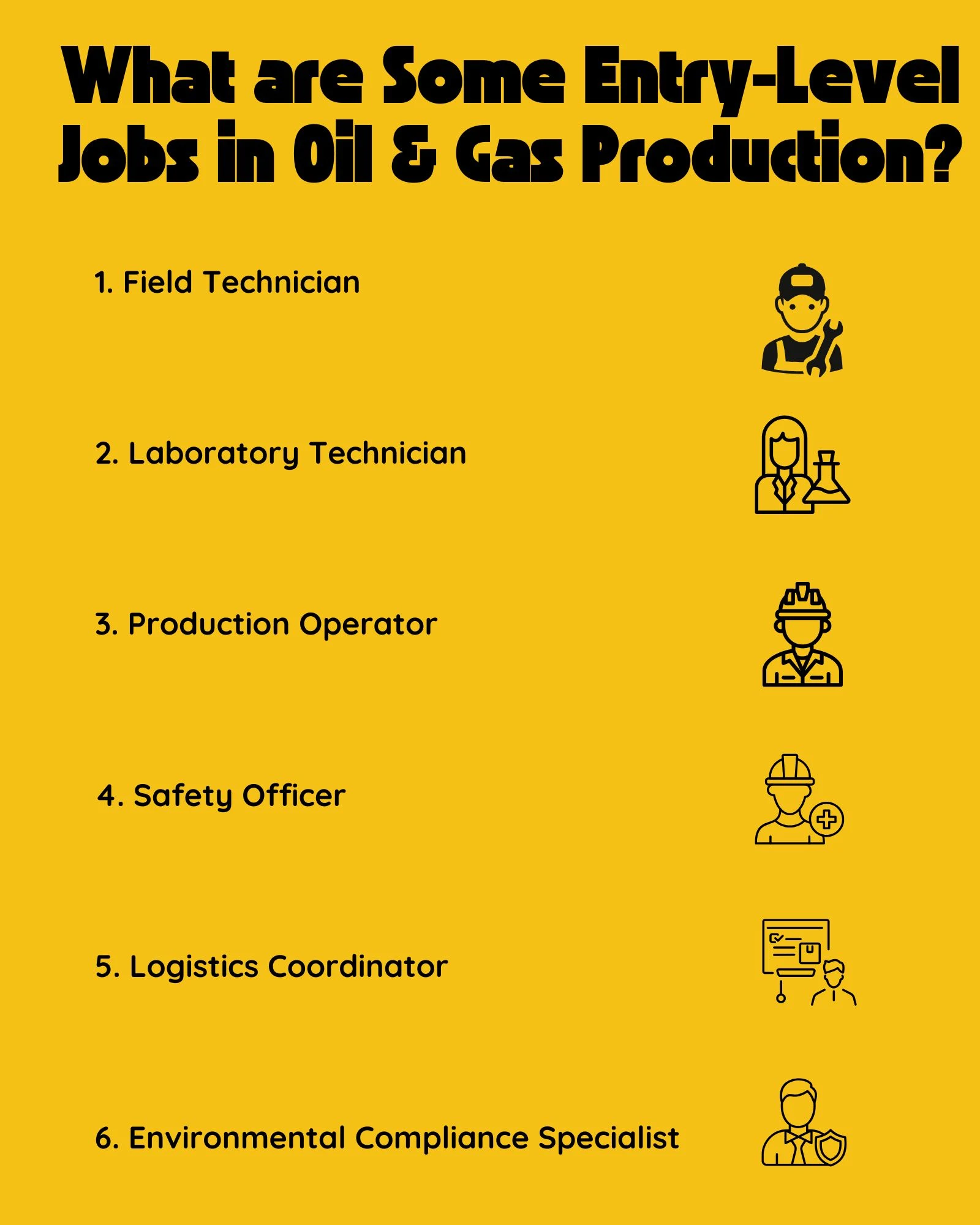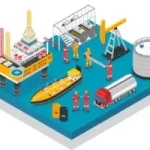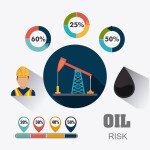- Table of Contents
- Introduction
- What Is Oil and Gas Production?
- How Many Jobs Are Available in Oil and Gas Production?
- Diverse Career Paths in the Oil and Gas Industry
- 1. Petroleum Engineer
- 2. Geoscientist
- 3. Pipeline Technician
- 4. Environmental Scientist
- 5. Project Manager
- 6. Research and Development Specialist
- 7. Health and Safety Specialist
- What are Some Entry-Level Jobs in Oil and Gas Production?
- 1. Field Technician
- 2. Laboratory Technician
- 3. Production Operator
- 4. Safety Officer
- 5. Logistics Coordinator
- 6. Environmental Compliance Specialist
- 8 Tips to Kickstart Your Oil and Gas Career
- 1. Gain Relevant Education and Training
- 2. Network and Seek Mentorship
- 3. Pursue Internships and Entry-Level Positions
- 4. Stay Updated on Industry Trends
- 5. Be Flexible and Open to Relocation
- 6. Develop Strong Communication Skills
- 7. Cultivate Problem-Solving Abilities
- 8. Embrace Sustainability and Environmental Awareness
- Oil and Gas Production Jobs: Important Things to Know
- Technological Advancements
- Safety and Environmental Considerations
- Global Nature of the Industry
- Ethical Decision Making
- Continuous Regulatory Changes
- Adaptability to Market Fluctuations
- Embracing Diversity and Inclusion
- Conclusion
Introduction
Choosing a career path is a crucial decision that shapes our professional lives. While the job market offers many options, the oil and gas industry continues to be attractive for many individuals. In this article, we will delve into the world of oil and gas production, exploring the reasons why it can be a promising career path. We will also discuss various entry-level job opportunities, provide insights into the industry as a whole, and offer five tips to help you kickstart your oil and gas career.
What Is Oil and Gas Production?
Oil and gas production refers to the process of extracting crude oil and natural gas from beneath the Earth's surface. These resources are fundamental in meeting global energy demands, powering industries, and fueling transportation systems. The vast oil and gas industry encompasses exploration, drilling, refining, transportation, and distribution.
How Many Jobs Are Available in Oil and Gas Production?
The oil and gas industry significantly contributes to job creation, offering many employment opportunities. Despite fluctuations in oil prices and geopolitical factors, the industry remains resilient and continues to hire skilled professionals. According to Construction Placements, the industry stands out as one of the most sought-after sectors for employment at present. It also emerges as a top contender for lucrative career paths, with an average 20% salary increase in the past year only.
Diverse Career Paths in the Oil and Gas Industry
One of the compelling aspects of pursuing a career in oil and gas production is the diversity of roles available. The industry caters to professionals with various skill sets, ranging from engineers and geologists to technicians and project managers. Here are a few notable career paths within the oil and gas industry:

1. Petroleum Engineer
Petroleum engineers stand at the forefront of oil and gas exploration and extraction. They are the architects behind efficient drilling techniques and the masterminds who design reservoir models. These professionals meticulously optimise production methods, ensuring that precious resources are efficiently extracted. Their role requires a deep understanding of geology, engineering, and fluid mechanics, making them indispensable in the industry’s quest for energy.
2. Geoscientist
Geoscientists are the Earth's detectives, deciphering its secrets to locate potential oil and gas reservoirs. Armed with advanced technologies and an acute understanding of geological formations, they use seismic imaging, well logging, and remote sensing to identify promising locations. Their findings are crucial for exploration activities, guiding companies to invest their resources wisely. Geoscientists are pivotal in mitigating risks and maximising the chances of striking valuable reserves.
3. Pipeline Technician
Pipeline technicians form the backbone of the industry's infrastructure. These professionals are responsible for the maintenance, inspection, and repair of extensive networks of pipelines that crisscross continents. Ensuring the safe transportation of oil and gas over vast distances, they are the guardians of a critical phase in the production process. Their expertise in pipeline integrity and safety protocols is indispensable, safeguarding both the resources and the environment.
4. Environmental Scientist
With a growing global focus on sustainability, environmental scientists have become integral to the industry. Their role is multifaceted, encompassing environmental impact assessments, compliance monitoring, and the development of eco-friendly practices. These professionals work closely with drilling teams, ensuring operations align with stringent environmental regulations. By integrating sustainable practices into the industry, environmental scientists pave the way for a more responsible and ethical oil and gas sector.
5. Project Manager
Project managers are the orchestrators behind the scenes, ensuring that every facet of oil and gas operations runs seamlessly. Their responsibilities include budgeting, scheduling, resource allocation, and risk management. They liaise between different departments, stakeholders, and contractors, ensuring that projects are completed on time and within budget constraints. A keen sense of leadership and in-depth industry knowledge is essential for project managers to navigate the complexities of large-scale operations successfully.
6. Research and Development Specialist
Innovation is the heartbeat of the industry’s progress. Research and development specialists delve into the realms of cutting-edge technologies, exploring avenues for increased efficiency and reduced environmental impact. They pioneer advancements in drilling techniques, automation, and renewable energy integration. These professionals drive the industry towards a more sustainable and technologically advanced future by pushing the boundaries of what's possible.
7. Health and Safety Specialist
Safety is paramount in the oil and gas sector. Health and safety specialists are dedicated professionals tasked with ensuring that stringent safety protocols are in place and adhered to. They conduct regular safety audits, implement training programmes, and develop emergency response plans. By fostering a safety culture, these specialists protect the workforce's well-being and mitigate operational risks, making them indispensable guardians of the industry's most valuable asset—its people.
With its myriad career paths, the oil and gas industry offers an ecosystem where diverse talents converge to address the world's energy needs. Each role is vital in the intricate puzzle of oil and gas production, emphasising the industry's interdisciplinary nature and the collective efforts required to sustain its growth and innovation. Aspiring professionals have the opportunity to explore these roles, finding their niche in a field that not only offers financial rewards but also the chance to significantly impact the world’s energy landscape.
What are Some Entry-Level Jobs in Oil and Gas Production?
Entering the oil and gas industry can be exciting for individuals starting their careers. Here are a few entry-level positions that can serve as a stepping stone towards long-term success:
1. Field Technician
Field technicians are the unsung heroes of oil and gas operations. Working in the heart of drilling sites, they gain firsthand experience in the complexities of extraction. Their tasks include assisting with drilling operations, conducting routine maintenance on equipment, and monitoring the production processes. This role offers a unique blend of physical work and technical learning. Field technicians learn to troubleshoot real-time issues, honing problem-solving skills crucial for the industry. Additionally, the exposure to diverse tasks provides a comprehensive understanding of the operational nuances, making it an ideal starting point for those eager to grasp the fundamentals.
2. Laboratory Technician
Laboratory technicians are the meticulous analysts behind the scenes. They work with samples obtained during exploration and production activities, conducting a range of tests to assess the quality of oil and gas reserves. These tests are vital in determining the composition and properties of the resources, ensuring they meet industry standards. Laboratory technicians operate highly specialised equipment, gaining expertise in precision and accuracy. Their work directly influences critical decisions made during drilling and refining processes. This role demands a keen eye for detail, making it ideal for individuals passionate about the technical aspects of resource analysis.
3. Production Operator
Production operators are the linchpins of day-to-day operations at drilling sites and production facilities. They monitor equipment, oversee the flow of oil and gas, and troubleshoot any issues that arise. This role demands a deep understanding of various systems and processes, ensuring the smooth functioning of operations. Production operators play a pivotal role in preventing downtime and maximising efficiency. They are responsible for routine inspections, maintenance tasks, and ensuring that safety protocols are followed diligently. This position offers a comprehensive view of the production lifecycle, providing a strong foundation for those aspiring to progress within the industry.
4. Safety Officer
Safety officers are critical in the oil and gas sector, ensuring that stringent safety protocols are established and adhered to. Their responsibilities include conducting regular safety audits, developing and implementing training programmes, and investigating incidents. Safety officers are instrumental in fostering a safety culture, emphasising the importance of following guidelines and procedures. They work closely with all levels of staff, emphasising the significance of vigilance in high-risk environments. This role demands a deep commitment to the well-being of the workforce and the protection of valuable assets, making it an essential starting point for those passionate about industry safety standards.
5. Logistics Coordinator
Logistics coordinators are the behind-the-scenes organisers, ensuring that materials, equipment, and personnel are where they need to be, precisely when needed. Their role involves meticulous planning, coordinating shipments, and managing inventories. In the fast-paced world of oil and gas, efficient logistics are paramount. Coordinators collaborate with various departments, suppliers, and transportation providers, optimising the supply chain. This role offers organisational and multitasking skills, offering a unique perspective on the industry’s intricate operations web.
6. Environmental Compliance Specialist
With the industry’s growing focus on environmental sustainability, compliance specialists play a pivotal role. They ensure that all operations adhere to environmental regulations and industry standards. Their tasks include conducting environmental impact assessments, monitoring emissions, and developing strategies for eco-friendly practices. Compliance specialists collaborate closely with environmental scientists and regulatory bodies, ensuring the company’s operations meet legal requirements. This role appeals to individuals passionate about environmental conservation, offering the chance to bridge the gap between industry demands and ecological preservation.
Each entry-level position is a foundational block, equipping individuals with practical knowledge and skills essential for a successful oil and gas industry career. Through hands-on experience, aspiring professionals learn the technical aspects of their roles and cultivate a deep understanding of the industry's demands and challenges. Moreover, these roles foster a strong sense of teamwork, adaptability, and professionalism – invaluable traits in the ever-evolving oil and gas production landscape. As individuals progress within the industry, the experiences and insights gained during these entry-level positions become the bedrock upon which their successful careers are built.
8 Tips to Kickstart Your Oil and Gas Career
Starting a career in the oil and gas industry can be both exhilarating and challenging. The industry demands technical expertise, adaptability, and a keen understanding of its intricacies. Here are eight crucial tips to help you not just start, but excel in your oil and gas career:
1. Gain Relevant Education and Training
A solid educational foundation is the cornerstone of a successful career in the oil and gas industry. Pursue degrees in engineering, geosciences, or related disciplines. Additionally, consider enrolling in industry-specific certifications and training programmes. These credentials enhance your skills, making you more marketable to potential employers. Lifelong learning is a norm in this field, so stay updated with the latest advancements through continuous education.
Certification | Description | Benefits |
Certified Petroleum Engineer | Focus on drilling, reservoir engineering | Validates expertise, essential for engineering roles |
Certified Safety Professional (CSP) | Expertise in safety regulations, risk management | Enhances safety knowledge, crucial for safety officer roles |
Project Management Professional (PMP) | Mastery of project planning, execution | Develops leadership skills, vital for project manager positions |
Certified Environmental Professional (CEP) | Specialisation in environmental regulations | Ensures compliance, crucial for environmental scientific roles. |
Certified Offshore Professional (COP) | Expertise in Offshore Drilling Operations | Specialised skills for working in offshore environments. |
Table 1: Certifications to acquire in the oil & gas industry
2. Network and Seek Mentorship
Building a professional network is paramount in the oil and gas sector. Attend industry conferences, seminars, and workshops. Join professional organisations related to your field of interest. Networking provides valuable insights into the industry and opens doors to potential job opportunities. Equally important is seeking mentorship from experienced professionals. Mentors offer guidance, share their experiences, and provide valuable advice, helping you navigate the industry's complexities more effectively.
3. Pursue Internships and Entry-Level Positions
Hands-on experience is invaluable. Seek internships or entry-level positions within the industry. These opportunities offer practical exposure to various facets of oil and gas operations. Internships allow you to apply classroom knowledge to real-world scenarios, while entry-level positions allow you to develop essential skills and build a professional network. Be proactive and approach companies, showcasing your enthusiasm and willingness to learn.
4. Stay Updated on Industry Trends
The oil and gas industry is continuously evolving. Stay informed about technological advancements, industry trends, and emerging practices. Follow industry publications, blogs, and research papers. Engage in online forums and discussions. Understanding the latest developments enhances your knowledge and demonstrates your commitment to professional growth. Employers value professionals who are well-informed and adaptable to changing industry landscapes.
5. Be Flexible and Open to Relocation
The oil and gas industry operates globally. Be open to relocation opportunities. Working in different locations provides diverse experiences, exposing you to various cultures and operational practices. International exposure enriches your professional journey and makes you more adaptable and resourceful. Additionally, your willingness to relocate showcases your dedication to the industry and enhances your career prospects.
6. Develop Strong Communication Skills
Effective communication is essential in the oil and gas industry. Engineers, scientists, and project managers must convey complex ideas and technical information clearly and concisely. Practise your communication skills, both written and verbal. Engage in group discussions, presentations, and debates. Strong communicators are valuable assets, as they can bridge the gap between technical expertise and practical application, fostering seamless collaboration within multidisciplinary teams.
7. Cultivate Problem-Solving Abilities
The industry often presents complex challenges that require innovative solutions. Cultivate your problem-solving skills by engaging in critical thinking exercises and puzzles. Participate in case studies and simulations related to oil and gas scenarios. Problem-solving abilities are highly valued in roles ranging from engineering to project management. Being able to analyse situations, identify issues, and propose effective solutions sets you apart as a proactive and valuable professional.
8. Embrace Sustainability and Environmental Awareness
With the global emphasis on sustainability, professionals in the oil and gas industry must have a strong understanding of environmental conservation practices. Familiarise yourself with sustainable technologies, renewable energy integration, and environmental impact assessment methods. Companies increasingly seek professionals who can balance industry demands with ecological responsibility. Having a sustainability background broadens your skill set and makes you an advocate for responsible practices within the industry.
Incorporating these eight tips into your career strategy provides a robust foundation for success in the competitive and ever-evolving oil and gas production field. By combining education, hands-on experience, effective communication, and adaptability, you can embark on a fulfilling career and contribute significantly to the industry’s innovation and sustainable future.
Oil and Gas Production Jobs: Important Things to Know
Before embarking on a career in oil and gas production, it is essential to understand a few key factors:
Technological Advancements
The oil and gas industry is at the forefront of technological innovation. Advanced drilling techniques, automation, data analytics, and machine learning have revolutionised operations. Professionals need to stay updated with these technological advancements. Continuous learning and adapting to new tools and technologies are imperative. Familiarity with software used for reservoir modelling, drilling simulations, and data analysis gives you a competitive edge. Embracing technology enhances efficiency and showcases your commitment to staying relevant in the ever-evolving industry landscape.
Technology Innovation | Description | Impact |
Advanced Drilling Techniques | Utilise directional drilling, reducing surface footprint. | Enhances resource recovery, minimises environmental impact. |
Automation and Robotics | Deploy drones and robots for inspections and maintenance. | Increases efficiency, reduces human exposure to hazardous environments. |
Data Analytics and AI | Analyse vast datasets for predictive maintenance and optimisation. | Improves decision-making, identifies operational inefficiencies. |
IoT and Sensors | Implement IoT devices and sensors for real-time monitoring. | Enables remote monitoring, detects anomalies, enhances safety protocols. |
Digital Twin Technology | Create digital replicas of physical assets for simulation. | Facilitates predictive maintenance, streamlines operational workflows. |
Table 2: Impact of technology in the oil & gas industry
Safety and Environmental Considerations
Oil and gas production involves inherent risks. It is essential to prioritise safety measures and adhere to environmental regulations. While this industry is known for its lack of on-site safety measures, incidents related to that have decreased by 17% over 10 years, according to LinkedIn. Companies in the industry strongly emphasise sustainable practices and minimising the environmental impact of operations.
Global Nature of the Industry
The oil and gas industry operates on a global scale. Professionals may find themselves working in different countries and diverse cultural environments. This international exposure is both enriching and challenging. Cultural sensitivity, adaptability, and effective communication across languages and customs are essential skills. Professionals often collaborate with international teams, navigate diverse regulations, and work in varied geographic and climatic conditions. Being open to diverse experiences and embracing the global nature of the industry can lead to a more enriching and multifaceted career.
Ethical Decision Making
Oil and gas professionals often face ethical dilemmas related to environmental impact, community relations, and corporate responsibility. Balancing economic interests with ethical considerations is a critical aspect of the job. Professionals must make decisions that are not only financially sound but also socially and environmentally responsible. Ethical decision-making skills are highly valued, contributing to the industry’s reputation and long-term sustainability.
Continuous Regulatory Changes
The oil and gas industry is subject to numerous regulations that vary from one region to another. Regulatory frameworks related to drilling practices, environmental conservation, and workplace safety are constantly evolving. Staying updated with these regulations and ensuring compliance is essential. Professionals often work closely with legal experts and regulatory bodies to navigate the complex landscape of laws and guidelines. Understanding these regulations is vital for mitigating legal risks and ensuring smooth operations.
Adaptability to Market Fluctuations
Market fluctuations, geopolitical events, and economic changes influence the oil and gas industry. Professionals need to be adaptable and resilient in the face of market uncertainties. This adaptability may involve adjusting production strategies, exploring new markets, or diversifying energy sources. Anticipating market trends and strategising accordingly is a valuable skill that enables professionals to navigate challenging economic climates.
Embracing Diversity and Inclusion
The industry is becoming increasingly aware of the importance of diversity and inclusion. Companies actively promote diverse workforces, recognising the value of varied perspectives and experiences. Embracing diversity not only fosters innovation but also creates a more inclusive workplace. Professionals need to work collaboratively, respecting and appreciating differences in culture, gender, and background. Building a diverse and inclusive industry is a moral imperative and a strategic advantage in fostering creativity and problem-solving.
Navigating these important considerations is essential for oil and gas production professionals. By embracing technological advancements, prioritising safety and environmental concerns, understanding the global landscape, making ethical decisions, staying informed about regulatory changes, adapting to market fluctuations, and promoting diversity and inclusion, individuals can build rewarding and impactful careers in this vital sector. Being mindful of these considerations enhances individual success and contributes to the industry’s sustainable growth and positive global impact.
Conclusion
Despite the world's transition towards renewable energy, the oil and gas industry thrives, offering many career opportunities. According to GoRemotely, the industry's future looks promising, with a projected Compound Annual Growth Rate (CAGR) of 6% and a market value expected to reach $7,425.02 billion in 2025. Whether you are fascinated by engineering challenges, geological exploration, or operational management, the oil and gas field caters to diverse interests and skill sets.
Starting with entry-level positions, staying abreast of industry trends, and embracing opportunities for international exposure are key to a successful oil and gas production career. With the right education, networking efforts, and a commitment to continuous learning, you can embark on a fulfilling and prosperous journey in this dynamic industry.
So, are you ready to dive into the world of oil and gas production? We can help you kickstart your career by offering a wide array of certified, up-to-date courses designed to provide you with the necessary knowledge and skills. Get in touch now, and let’s embark on this exciting journey together!
























